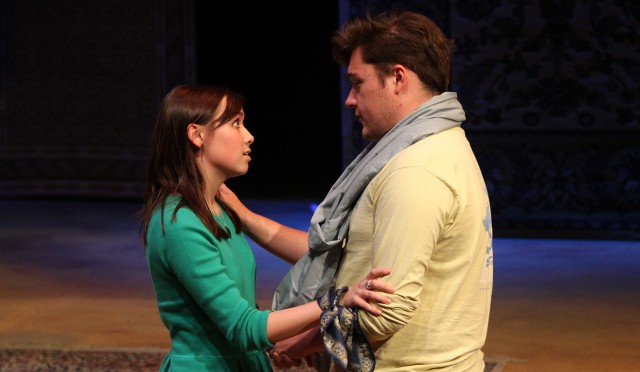
By Kat Worrall
Staff Writer
In Baylor Theatre’s newest sold-out play, “The Arabian Nights,” Flower Mound junior Chynna Walker acts as the storytelling Scheherezade, Walker’s first leading role at Baylor.
Each day, King Shahryar marries a new girl, and each night, King Shahryar kills his new wife.
This cycle continues until a new wife, Scheherezade, begins weaving a long web of stories each night, leaving him wanting to hear more, and thus prolonging her life a little more each day.
The theme of storytelling and transformation almost mimics Walker’s own experience with theater. She remembers acting used to terrify her as a seventh-grade student, but now she loves acting and telling her own stories.
“Theater also scared me so much, so I never wanted to do it,” Walker said. “I was always saying, ‘I would probably like it, though. I should do it.’ So I made myself do it and ended up really loving it.”
Her first role, playing a made-up character Betsy in the play “Worst High School Player in the World,” had no lines. All Walker did was follow her “sister” and the other actors around on stage, silently responding to whatever they did.
While the role might seem small, Walker said that was what got her hooked on theater.
“I went with it and made her whatever I wanted to, because I had completely free reign,” Walker said. “It was the most fun thing I had ever done.”
When Walker applied to colleges, she left it up to chance on whether or not she would continue pursuing theater.
“I kind of doubted it,” Walker said. “I never knew exactly if I wanted to do theater and even when applying to colleges, I only applied to two colleges close to home. I thought, ‘If I get into a theater department, I’ll go, but if not, that’s OK. I’m not supposed to do that.’”
After she did get accepted into Baylor’s theater performance program, Walker decided to pursue theater full time, though she did experience doubt at times with her decision.
“The Lord really played a big part in that, just because I was trying to do what He wanted me to, and I think He always kind of pulled me back to theater,” Walker said. “Christians in the department always question it because it is so self-centered and you’re very focused on how good you’re doing. Actors are the most insecure people in the world. ‘Are we doing well? Are we not?’ I think that is something that I’ve learned that this the battle I have to face and I have always been pulled to it without knowing why.”
Walker and the opposing male lead, Sonora senior Colyer Dermody, guide the story line of “The Arabian Nights.” However, both Walker and the play’s director, Lisa Denman, the undergraduate program director for Baylor’s theater department, label the play an ensemble show.
“It’s less focused on one person and more focused on the whole cast creating a story,” Walker said. “Yes, I’m the person who tells the stories, but most of the play is them acting out my stories.”
What Walker begins, other actors soon take over and that can get complicated, Denman said.
“It’s a tricky part, because she starts the stories and will often interject in the middle of the story, but for a good part of the time, she is watching the story unfold in front of her,” Denman said. “These are her stories, but she brings them to life and then the other actors act them out.”
For most of the play, Denman said, nearly all of the actors are on the stage at once, while sometimes darting off to switch costumes or grab a prop. Walker and Dermody, though, she calls the “bookends to the play.”
“It’s a really interesting play in that it’s so ensemble,” Denman said. “At one moment, there’s one actor who is front and center, and then there’s another. It feels like a group of people telling a story, so I think it is a cool thing from them to be a part of an ensemble like that.”
Walker said one of her challenges with her role as Scheherezade is the language.
“It’s not everyday language,” she said. “It’s more poetic, so it has been hard to make it realistic.”
She also has to overlap her lines with other actors as they take over her stories.
“A lot of her lines that she says are simultaneous with other actors, so she had to learn how those actors were going to say their lines so she could have the same inflection and timing,” Denman said.
Walker said she hopes to bring out Scheherezade’s characteristics in herself in order to properly connect to the role.
“She is more brave than other people,” Walker said of her character. “She is the one who changes it and changes him. She is beyond her years, but she is also a young, innocent girl whose mind is full of imagination.”
As the entire cast prepares for tonight’s opening night, Denman said the group, which she calls a “little family,” should be proud of their work.
“I’m hoping that the actors really feel a sense of pride and ownership as they do the play because I think they all put a lot of time, energy and effort into the play,” Denman said. “I hope the audience likes it. I hope they think it’s funny, but that they also take away something from the play.”
This adaption of “The Arabian Nights” has a message of art and the transformation of storytelling, Denman said.
“It’s a beautiful reminder of how stories are told,” Walker said. “Being able to see those stories and capture them and communicate them — that’s what we do as actors in theater.”



